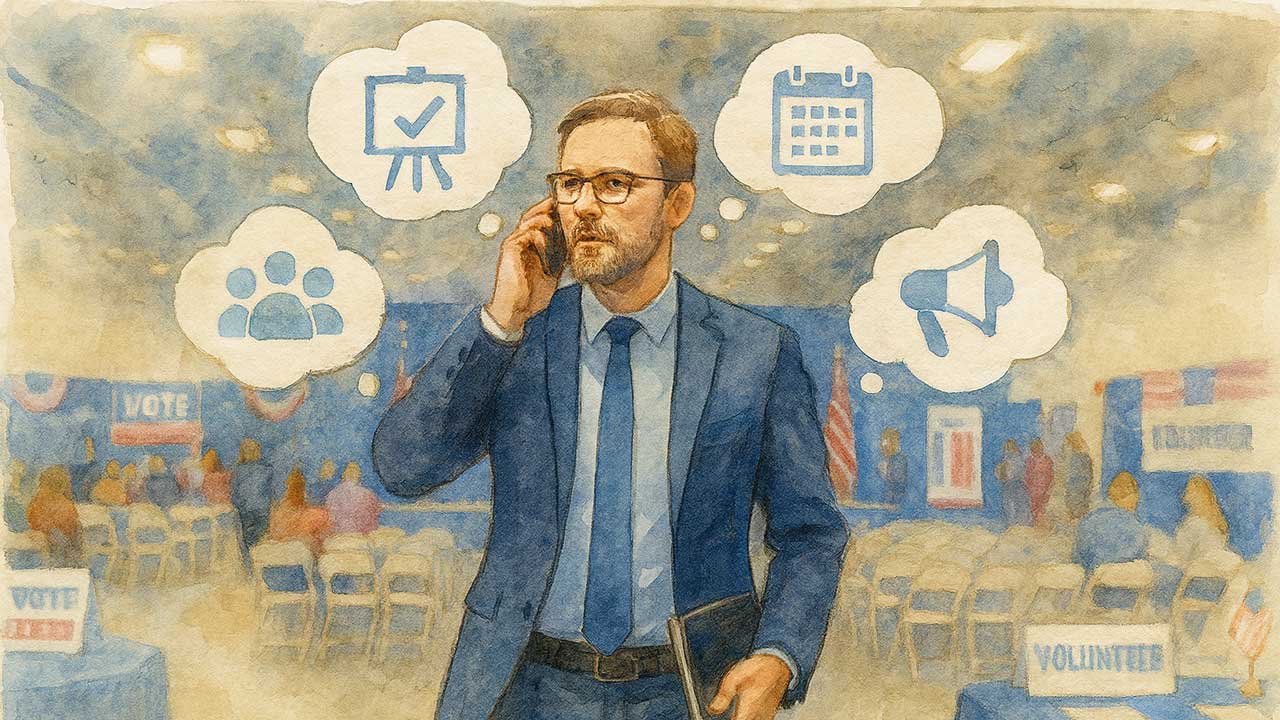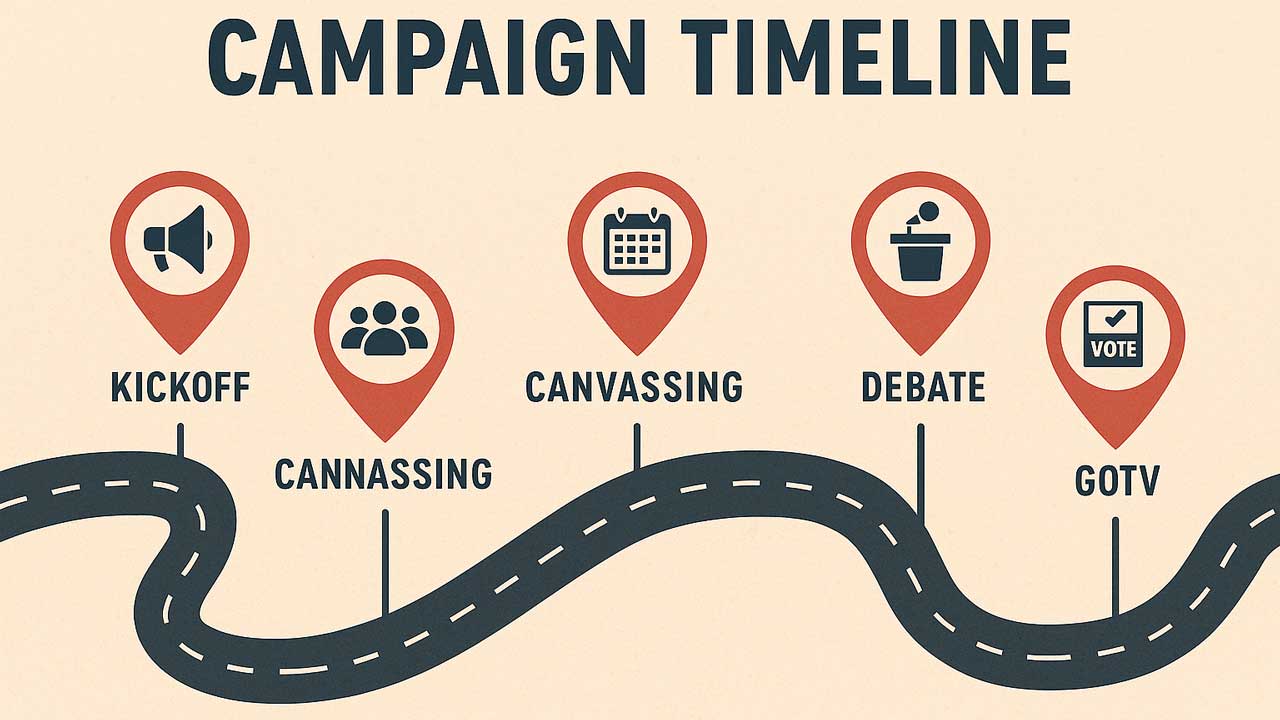The Critical Role of a Campaign Manager
Every election season is littered with stories of candidates who had passion, strong resumes, and even name recognition but still lost because their campaigns lacked organization. Studies show that structured campaign activity, particularly voter contact, is one of the most significant factors in winning close races. Yet the person who ensures that structure exists, the campaign manager, often gets overlooked until it is too late.
Too many first-time candidates assume that enthusiasm and community ties will carry them through. In reality, running for office is a project of enormous complexity. The campaign manager is the single most important hire a candidate will make, and when chosen wisely, this role can multiply a candidate’s odds of victory several times over. This article explores what candidates should look for when hiring a campaign manager, the common traps to avoid, and why this role is indispensable in competitive politics.
Misconceptions and Core Responsibilities
A novice candidate once told me he was considering a certain individual for campaign manager because that person “did not take crap.” When I pressed him on what that meant, he was completely unable to explain how that trait would apply to his campaign strategy or playbook. His response was clearly improvised, an attempt to cover for a careless remark. This revealed a deeper problem: neither the candidate nor the prospective campaign manager truly understood their roles or how strategy should guide the campaign.
What a Campaign Manager Does
The reality is that a campaign manager is not a sidekick but a coach. A strong campaign manager should not take unnecessary grief, but equally important, they must also be willing to challenge the candidate. Their job is to balance a ground-level view of events with a 30,000-foot strategic perspective. Candidates are busy making fundraising calls, writing thank-you notes, and shaking hands at community events. They often cannot see the bigger picture in real time. The campaign manager provides that vision and keeps the operation moving toward Election Day.
A campaign manager’s role stretches far beyond scheduling appearances or sending press releases. They are the strategist and tactician who transform campaign goals into actionable plans. They coordinate fundraising efforts, field operations, communications, and compliance, ensuring that no essential function is neglected. They also serve as an accountability partner, protecting the candidate from burnout, enforcing discipline, and stepping in when tough advice must be delivered.
Traits and Red Flags in a Campaign Manager
The best campaign managers share several defining qualities. They are project managers who can juggle long-term plans while adapting to unexpected challenges. They are personable yet forceful, capable of motivating staff while enforcing deadlines. They set the tempo of the campaign like a conductor leading an orchestra, ensuring momentum never stalls.
A trusted manager is also a confident advisor. Candidates must be willing to hear difficult truths, and a strong manager will not shy away from delivering them. Protecting the candidate’s time and reputation is another key duty. By managing logistics and shielding the candidate from unnecessary burdens, the manager ensures the candidate remains focused on high-value activities. Their presence at campaign events is critical, capturing speeches, engaging volunteers, and building networks. While campaign experience is useful, many successful managers bring transferable skills from other professions such as logistics, small business, or real estate.
Just as there are positive traits to seek, there are warning signs to avoid. Beware of so-called campaign managers who are really just digital advertisers selling their services. Campaigns require more than online ads; they demand integrated strategy across all areas. Other red flags include yes-persons who only echo what the candidate wants to hear, micromanagers who burn out staff, and resume-chasers looking past the current race to their next opportunity. Perhaps most concerning are candidates who cannot clearly explain their strategic approach—undefined philosophies usually signal trouble ahead.
How to Hire Wisely
Vetting a potential campaign manager requires more than a handshake. Candidates should ask scenario-based questions to understand a manager’s operating style. How would they respond to a negative news story breaking on the eve of a fundraiser? What steps would they take if donations suddenly dried up? Their answers reveal judgment and adaptability.
References are also critical. Speak with past candidates, staff, and volunteers to get candid assessments of how the manager actually performed. Chemistry and trust are non-negotiable, as the candidate-manager relationship is the backbone of the campaign. If communication breaks down, everything else follows.
Finally, formalize the relationship. A campaign manager should be engaged as an independent contractor through a professional services agreement, not as an employee. This avoids payroll tax liabilities and employment law issues. A non-disclosure agreement should also be standard to protect sensitive donor information and campaign strategy.
Compensation packages for local campaigns can take many forms: a monthly flat fee, a percentage of total raised revenue (usually 10–15%), a stipend, or some hybrid model paid on a regular basis. On small campaigns, managers sometimes volunteer in exchange for a job reference or with the hope of consideration for a political appointment after the election.
The Risks of Running Without a Manager
Some candidates try to forgo a manager, usually for budget reasons. While it may work in very small races, the risks are steep. Without professional leadership, campaigns often spiral into disorganization, volunteers lose direction, and candidates become overwhelmed. Good intentions from friends and family rarely substitute for disciplined management.
Alternatives such as part-time consultants or splitting responsibilities among volunteers can help, but they rarely equal the effectiveness of an experienced campaign manager. Evidence from campaign operations research suggests that candidates with structured leadership consistently outperform those without. In practice, having a campaign manager can greatly improve odds of success as compared to running without one.
There are no perfect campaign managers, and it is true that the most experienced ones are usually working for candidates above the local level. Still, hiring someone who checks many of the boxes is far better than going without a campaign manager in a local race.
Final Thoughts on Hiring a Campaign Manager
A strong campaign manager is the cornerstone of a successful run for office. They bring order to chaos, discipline to distraction, and strategy to ambition. Candidates should seek individuals who are organized, confident, personable, and trusted. They must avoid pretenders who masquerade as digital gurus, yes-persons, or resume-chasers.
Hiring a campaign manager is more than a formality. It signals seriousness to donors, voters, and the media. With the right manager in place, a candidate is better prepared for the challenges of an election and dramatically more likely to win. The bottom line is simple: if you are serious about winning, you must be serious about hiring a campaign manager.



